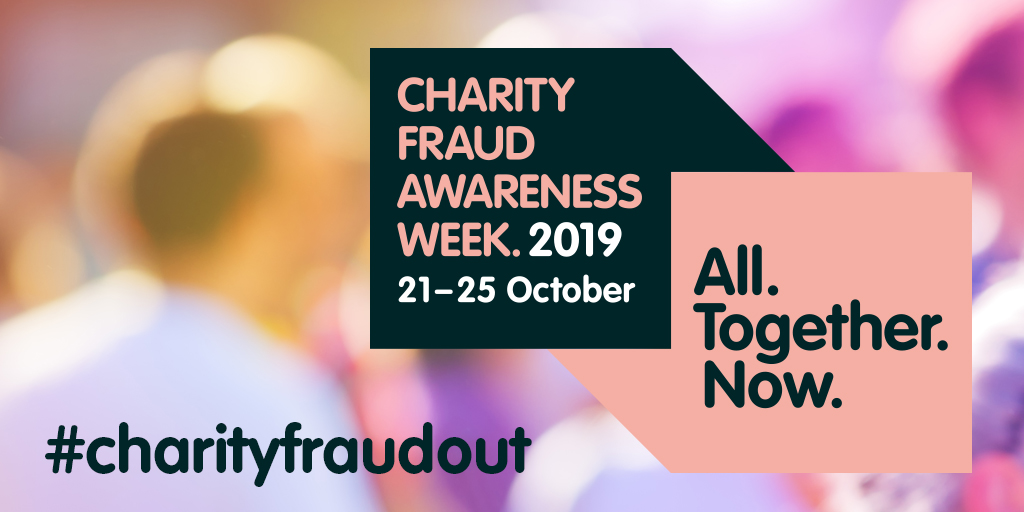Protect your Charity from Fraud – Back to Basics
 Charity Fraud Awareness Week promotes openness and honesty about fraud bringing together everyone involved in the charity and not-for-profit sectors to raise awareness and share good practice in tackling fraud and financial crime.[1] The week is led by the Fraud Awareness Panel, consisting of over 40 charities, regulators and other not-for-profit stakeholders from across the world working in partnership to combat fraud against charities.
Charity Fraud Awareness Week promotes openness and honesty about fraud bringing together everyone involved in the charity and not-for-profit sectors to raise awareness and share good practice in tackling fraud and financial crime.[1] The week is led by the Fraud Awareness Panel, consisting of over 40 charities, regulators and other not-for-profit stakeholders from across the world working in partnership to combat fraud against charities.
As the beginning of the week, the Charity Commission for England and Wales published research about the biggest fraud risks facing charities based on a study of over 3000 charities.[2]
According to the Commission, the study shows that many charities are not doing even the basics to protect themselves. Most (60%) of those surveyed believed that fraud was a major threat to the charity sector and further that internal fraud was one of the biggest threats.
Perhaps more worryingly, is the number of charities that don’t think their charity is vulnerable to any of the most common types of charity fraud (34%) and that whilst more than three-quarters think they are doing everything they can to prevent it (85%), the survey actually found that more than half don’t have any good-practice protections in place. So, there is a possibility that charities are not adequately identifying the risks of fraud and/or placing sufficient controls and mitigations in place. The Charity Commission sees a “gap between awareness and practical action” that is both threatening charities’ funds and public trust in the sector.
 Back to Basics
Back to Basics
The Charity commission recommends the following simple steps to help protect against both external and internal fraud:
- Have in place basic financial controls such as having at least two signatories to bank accounts and cheques; undertaking regular bank reconciliations and checks etc.
- Ensure that no one single individual has oversight or control of financial arrangements – effective segregation of duties is a crucial method of preventing and detecting fraud.
- Encourage and make it easy for staff, volunteers and trustees to speak out when they see something they feel uncomfortable about – ensure that there is an effective whistleblowing policy in place and encourage a culture of openness and honesty.
Preventing Charity Fraud Insights and Action – the Report
The report [3]published by the Commission is worth reading and includes useful insights and suggested actions for charities to take:
- Acknowledging fraud is the first step towards prevention – charities should recognise the risk and understand the harm it can cause.
- Fraud awareness remains low and whistleblowing arrangements are far from universal – charities should recognise they can be vulnerable to different types of fraud, strengthen whistleblowing arrangements and introduces awareness programmes.
- There is a lot to do to better identify and report fraud – Charities should improve their knowledge of the most common types of fraud and ensure adequate reporting arrangements.
- Fraud committed by staff has fallen but fraud by volunteers and trustees has doubled. Application of financial controls and audit remain core to identifying fraud quickly – charities should be satisfied that effective prevention controls are in place and everyone involved need to know how to identify and report fraud.
- The effect of fraud is more detrimental than 10 years ago, especially in relation to reputation – charities should focus on prevention rather than cure.
- Excessive trust is the main contributory factor and more needs to be done to embed cultures of scrutiny and challenge – financial controls should be reviewed regularly. Alternative prevention and detection arrangements should be put in place instead of excessive reliance on trust and goodwill.
 Help Sheets and Other Resources
Help Sheets and Other Resources
As part of their work, the Fraud Awareness Panel publish a number of useful resources available on the Charity Fraud Awareness Hub. This includes case studies, webinars, practical tutorials and help sheets.
The Help sheets cover a range of topics, some of which are suitable for smaller charities and some which are general and apply to all. Each Help sheet includes, steps to help you get started and a checklist, designed to help charities ask the right questions of themselves. Help sheets include:
- Board Support for Counter Fraud –covers building an ethical culture and encouraging people to voice their concerns. Importantly it highlights that effective response should be appropriate and proportionate to the size and activities of the charity.
- Cyber Security –covers the threat of cyber security to a charity’s data and funds and resulting reputational damage. It includes some simple steps for smaller charities to take to help minimise the risk or effects of such attacks.
- Financial Crime Risks –covers the risks of financial crime particularly when working internationally.
- Getting to Know Your Volunteers –covers conducting proper due diligence in recruitment and management, putting appropriate policies, processes and practices in place, the warning signs and handling suspicions.
- Keeping Personal Data Safe – an introduction to protecting personal data, the importance of keeping it safe and the common risks.
- Charity Retail Fraud –highlights the risks facing charity shops; the differences but intrinsic link between theft and fraud; common risks and basic controls.
- Volunteer Fundraising Fraud –covers the risk of funds being diverted from the purposes for which they were donated – causing damage to reputation and morale. It covers the fraud committed when a person raises money for a cause but doesn’t pass all of it on to the charity including the common risks, basic controls and also the differences between premeditated and spontaneous frauds.
Other help sheets include Fundraising in an emergency; Fundraising event fraud; Whistleblowing; Moving money safely; getting to know your donors and staff; and Legacy fraud.
As the Commission comments in its report, fraud is an ever-changing risk. It “evolves continually, and faster, thanks to digital technology.” It is therefore imperative that charities are alert and give themselves the tools needed to respond quickly and effectively to this constantly changing threat.
Help where you need it
With strong experience in the charity sector, Bridgehouse Company Secretaries is well placed to help your organisation with all elements of charity governance including the review and drafting of policies and processes, as well as providing fraud prevention services.
For more information and to get in touch click here.
[1] https://www.fraudadvisorypanel.org/charity-fraud/charity-fraud-awareness-week/
[2] https://www.gov.uk/government/news/new-research-reveals-the-biggest-risks-to-charities
[3]https://assets.publishing.service.gov.uk/government/uploads/system/uploads/attachment_data/file/840652/Web_CC_Fraud.pdf
